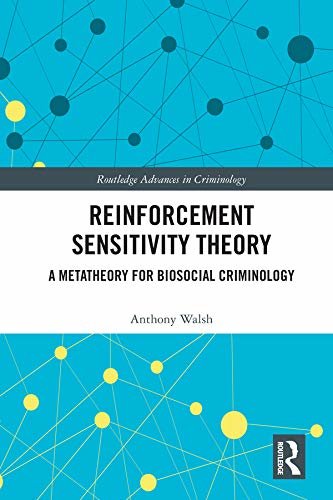
Reinforcement Sensitivity Theory: A Metatheory for Biosocial Criminology (Routledge Advances in Criminology) (English Edition)
- 作者
- Anthony Walsh
- 语言
- 英语
- 出版社
- Routledge 版次:第 1st 版
- 出版日期
- 2018年10月17日
- 纸书页数
- 254页
- 电子书格式
- epub,pdf,mobi,azw3,txt,fb2,djvu
- 文件大小
- 2936 KB
- 下载次数
- 4480
- 更新日期
- 2023-05-06
- 运行环境
- PC/Windows/Linux/Mac/IOS/iPhone/iPad/iBooks/Kindle/Android/安卓/平板
内容简介
Some of the brightest minds in criminology who were nurtured on the strictly environmentalist paradigm of the 20th century have declared that biosocial criminology is the paradigm for the 21st century. This book attempts to unite this ever-growing field with the premier neurobiological theory of personality, otherwise known as reinforcement sensitivity theory (RST). Anthony Walsh places the highly variable number of biosocial approaches under a single theoretical umbrella, whilst providing a unique integrative framework.
As the leading neurobiological theory of personality and behavior in psychology today, RST focuses around the age-old question of how naturally selfish social animals can achieve their wants and needs without alienating others in their social groups. RST posits that evolution has built into humans three interacting systems: the behavioral approach system; the behavioral inhibition system; and the fight/flight/freeze system. RST identifies the neurobiological and genetic functions underlying each system and has found a cascade of supporting evidence.
Throwing new light on many areas of concern to criminologists, such as psychopathy, violence, ADHD, and schizophrenia, this book will be of interest to scholars and upper-level students in the field. Additional features such as Focus Boxes and diagrams delve into measurement techniques and brain areas.
Reinforcement Sensitivity Theory: A Metatheory for Biosocial Criminology (Routledge Advances in Criminology) (English Edition) EPUB, PDF, MOBI, AZW3, TXT, FB2, DjVu, Kindle电子书免费下载。
- John Frederick Oberlin/h (English Edition) John W. Kurtz
- South Carolina: A Geography (English Edition) Charles F Kovacik、John J Winberry
- The Theatre Arts Audition Book for Men (English Edition) Annika Bluhm
- Palestinian Culture and the Nakba: Bearing Witness (Routledge Advances in Middle East and Islamic Studies Book 26) (English Edition) Hania A.M. Nashef
- The Receiving End (Routledge Revivals: Noel Timms) (English Edition) Noel Timms
- 青少年体育运动指导与实践(修订版) 罗宾·S·维莱、梅利莎·A·蔡斯
- Nicotine Addiction Among Adolescents (English Edition) Eric F Wagner
- 烈旭照清河(套装共两册)【晋江人气作者帘十里作品,甜宠都市言情,一场漫长岁月里的满分恋爱】 帘十里
- The Secondary Behaviour Cookbook: Strategies at Your Fingertips (English Edition) Sue Roffey
- Suicide by Cop: Committing Suicide by Provoking Police to Shoot You (Death, Value and Meaning Series) (English Edition) Mark Lindsay、David Lester, PhD.
- Festival Stories of Child Life in a Jewish Colony in Palestine. (Routledge Revivals) (English Edition) Hannah Trager
- Psychoanalytic Perspectives On Women (English Edition) Elanie V. Siegel
- Physical modelling in coastal engineering: Proceedings of an international conference, Newark, Delaware, August 1981 (English Edition) R.A. Dalrymple
- 九畹芳菲——巩本栋教授荣休纪念文集 (中华书局) 葛云波
- 一个人,也可以活成千军万马(人气电台节目“给同样失眠的你”主播凌峰首部情感治愈文集,一辈子这么长,你不会永远有人陪伴,总要单枪匹马,独上疆场,与孤独打一场仗。愿你成为一个温柔的人,也愿你被这个世界温柔相待。) 凌峰
- 不是天才【知乎艺术达人苏也带我们走近当代艺术界的一流大师】 苏也
- Women, Work and Trade Unions (Routledge Studies in Employment and Work Relations in Context) (English Edition) Anne Munro
- 动漫角色 场景与衍生品设计 盛萍
- 中外建筑风格分析 梁莺歌、刘浪
- 高效呼吸训练:舞蹈、瑜伽、普拉提的功能性练习(高效呼吸 呼吸的功能性训练 呼吸在舞蹈、瑜伽和普拉提中的作用) 埃里克·、富兰克林
- 50岁之后的力量训练(第3版修订版)(硬派健身中老年版,50岁以上人士的健身解决方案 ) 韦恩·L·韦斯科特、托马斯·R·贝希勒
- Cultural Icons (Intervention Press) (English Edition) Keyan G Tomaselli、David Scott
- 爆文制造【读者·新媒体首部写作书】 虢雪
- Mobility And Employment In Urban Southeast Asia: Examples From Indonesia And The Philippines (English Edition) Michael A. Costello
- Desert Landscape Architecture (English Edition) John C. Krieg
- The Freshman: Comedy and Masculinity in 1920s Film and Youth Culture (Cinema and Youth Cultures) (English Edition) Christina G. Petersen
- Institutional Ownership and Multinational Firms: Relationships to Social and Environmental Performance (Transnational Business and Corporate Culture) (English Edition) James J. Kennelly
- 笔墨千年 苏轼寒食帖 赤壁赋 凤凰空间
- Social Work: An Outline for the Intending Student (Routledge Revivals: Noel Timms) (English Edition) Noel Timms
- 孤鹰(马伯庸、赵文卓、祖峰、宋洋力荐的悬疑卧底小说,孤胆英雄与大毒枭的正面交锋) 邵雪城